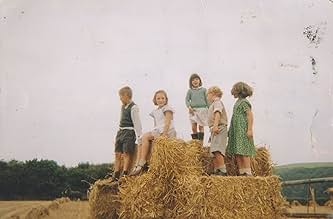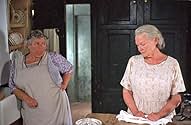Duas irmãs se tornam amigas de um misterioso estrangeiro que se banha na praia em sua vila costeira em Cornualles.Duas irmãs se tornam amigas de um misterioso estrangeiro que se banha na praia em sua vila costeira em Cornualles.Duas irmãs se tornam amigas de um misterioso estrangeiro que se banha na praia em sua vila costeira em Cornualles.
- Direção
- Roteiristas
- Artistas
- Prêmios
- 3 indicações no total
- Fisherman
- (as Ian Marshall)
- Direção
- Roteiristas
- Elenco e equipe completos
- Produção, bilheteria e muito mais no IMDbPro
Avaliações em destaque
Ursula (Judi Dench) and Janet (Maggie Smith) are elderly sisters living a quiet life of gardening, strolling the cliffs and beach of Cornwall, knitting, and reading. Their bumpy housekeeper Dorcas (Miriam Margolyes) cooks, cleans, shops, and chatters in a wonderful Cornish brogue, allowing the sisters to live an otherwise isolated life - isolated from history, personal emotions, and vulnerabilities. After a storm Ursula spies a figure on the beach below their home and the two descend to find an unconscious handsome young man whom they rescue, house, nurture, mend a broken ankle and ultimately become doting adorers. The young man Andrea (Daniel Brühl) finally awakens, speaks no English as he is Polish, and his charming ways attract inner emotions in both sisters. Janet studies some German and is able to speak with Andreas, while Ursula pastes English words on items in his room to teach him English. He mends and it is discovered that he is a concert violinist who was shipwrecked while striving to go to America. A Russian visitor to the town, Olga (Natascha McElhone), the requisite 'evil witch' for a fairy tale, hears Andreas play, informs him she has a cousin who is a famous violinist, and attracts him away from Cornwall to London where he ultimately gives his own concert.
Those are the bare facts of the film's story. The magic lies not in the story itself but in the submerged feelings of the two sisters. Ursula, having never been in love in her youth, falls in love with Andrea, fully aware that there is no possibility of consummation. She feels long desired emotional attachment to the lad and the stirring in her breast is overwhelming to her. Janet, who once loved but lost that love to death, likewise falls for Andrea. It is this sibling rivalry over the passion for Andrea that provides some of the most touching and understated brilliant acting moments ever recorded on film. There is a scene where, resting from a stroll on the cliffs, Andrea rests with his head on Ursula's lap, perhaps the first physical contact with a man she has ever known, and the gentility of the slow and reticent placement of her hand on Andrea's resting head is a crystal of acting magic. How the sisters cope with this time with Andrea and his eventual leaving for his career is the climax of the film. And touching and understated it is.
Judi Dench and Maggie Smith give pitch perfect characterizations, creating two lovely beings we will never forget. Likewise Daniel Brühl is superb in a role far different from his usual German repertoire (Goodbye Lenin!, The Edukators, Love in Thoughts) and manages to create the illusion that he is actually playing the violin (while the true artist is Joshua Bell in some stunning performances). The atmosphere of Cornwall is magically captured by Dance and his cinematographer Peter Biziou with assistance from Ed Rutherford. Nigel Hess has written a musical score, incorporating well-known classical violin works as well as his own hauntingly beautiful music that adds immeasurably to the film's success.
LADIES IN LAVENDER is not a major blockbuster of a success nor does it try to be. It is simply a exquisitely crafted and acted fairy tale that gently reminds us that age does not prevent the heart from responding to that most beautiful of emotions, Love. Highly recommended. Grady Harp
Both Judi Dench and Maggie Smith are at their bests, Dench probably showing a broader range of emotions. Daniel Brüll is also quite worth mentioning as the young dreamy-eyed violinist. Natasha McElhone gives a solid supporting act. And it's a real treat to the ears by Joshua Bell, who masterfully played all the violin compositions.
What can be said is that this film belongs to Maggie Smith: although Judi Dench has the lovelorn role of the smitten sister, it is Dame Maggie who has the wider variety of emotions, the presence, and the charisma which gives the film the energy it needs to involve the viewer. A case in point is the scene where Dame Judi has her point of emotional release - and Dame Maggie tops it with just the slightest nuance of phrase. Indeed, hers is a performance of subtlety and delicacy, so understated and insightful, that it recalls the outstanding work that she did in "The Lonely Passion of Judith Hearne". If it was up to me, Dame Maggie would be right up there in contention for the Oscar and BAFTA.
She is, of course, perfectly paired with Dame Judi, who creates a portrayal of both pathos and charm. There is such rapport between the two that it wipes away memories of the caricatures of "Tea With Mussolini" and replaces it with genuine truth and humanity. The two dames are underscored by the comic bluster of Miriam Margolyes and the suspicious lusting of David Warner.
This is a film of emotion and elegance. If it lacks narrative drive and dynamic then it is more than made up for by the space created for the talents of the actors. It is a film which lives on in the memory - and for that we mainly have to thank the performance of Maggie Smith.
"Ladies in Lavender" is a captivating film. It is very strong in both story telling and in acting. Both Judi Dench and Maggie Smith did excellent in portraying love and jealousy. It is amazing that by just one look on the face, you can tell how the characters are thinking. The story telling is subtle by the acting is so direct. "Ladies in Lavender" draws me, captivates me and touches me. I think this film deserves a wider audience. It is a pity, that many people may not give this film a chance because they think the target demographic is towards the older generation.
Você sabia?
- CuriosidadesMaggie Smith and Judi Dench were performing together in a West End play when they received the scripts. They consulted each other, and decided to do the project.
- Erros de gravaçãoMains electricity, gas lighting and indoor flush toilets were unlikely to be present in remote village houses in 1936 Cornwall.
- Citações
Andrea Marowski: [Andrea is about to leave, turns to Ursula] I walk.
Ursula Widdington: Oh, good. Um... we have chicken for supper.
[Andrea looks at her, not understanding]
Ursula Widdington: Um, um...
[she picks up Janet's German-English dictionary, but stops before opening it]
Ursula Widdington: Oh! Uh, Hundchen zum Abendessen.
[subtitles: Puppydog for supper]
Andrea Marowski: [he laughs] Hundchen?
Ursula Widdington: Hundchen, ja.
Andrea Marowski: Das ist gut. Wiedersehen.
[subtitles: That's good. Goodbye]
Ursula Widdington: I'll see you later.
- Cenas durante ou pós-créditosSpecial thanks to the people of Helston, Cornwall and the people of Cadgwith, Cornwall.
- Trilhas sonorasSince Father Did a Broadcast on the BBC
Written by Robert Rutherford (as Rutherford) and Elliot
Performed by Arthur Askey with The BBC Dance Orchestra
Principais escolhas
- How long is Ladies in Lavender?Fornecido pela Alexa
Detalhes
- Data de lançamento
- País de origem
- Central de atendimento oficial
- Idiomas
- Também conhecido como
- Ladies in Lavender
- Locações de filme
- Prussia Cove, Rosudgeon, Cornwall, Inglaterra, Reino Unido(Ursula & Janet's cottage)
- Empresas de produção
- Consulte mais créditos da empresa na IMDbPro
Bilheteria
- Faturamento bruto nos EUA e Canadá
- US$ 6.765.081
- Fim de semana de estreia nos EUA e Canadá
- US$ 149.224
- 1 de mai. de 2005
- Faturamento bruto mundial
- US$ 20.421.130
- Tempo de duração
- 1 h 44 min(104 min)
- Cor
- Mixagem de som
- Proporção
- 1.85 : 1








































